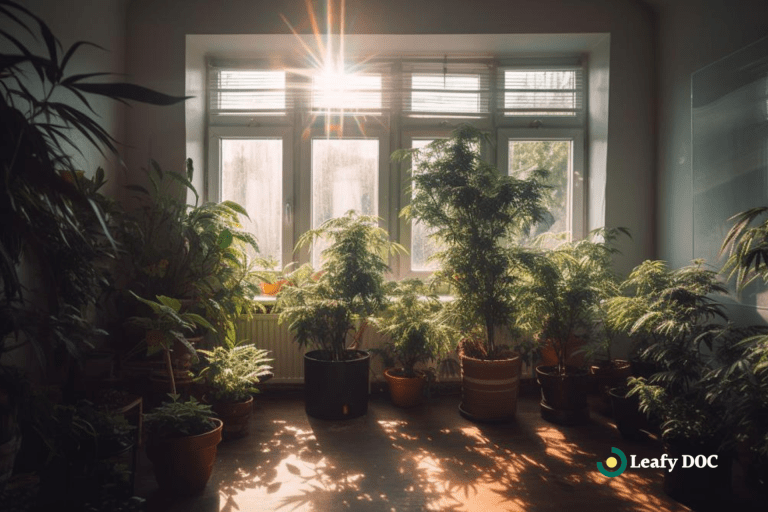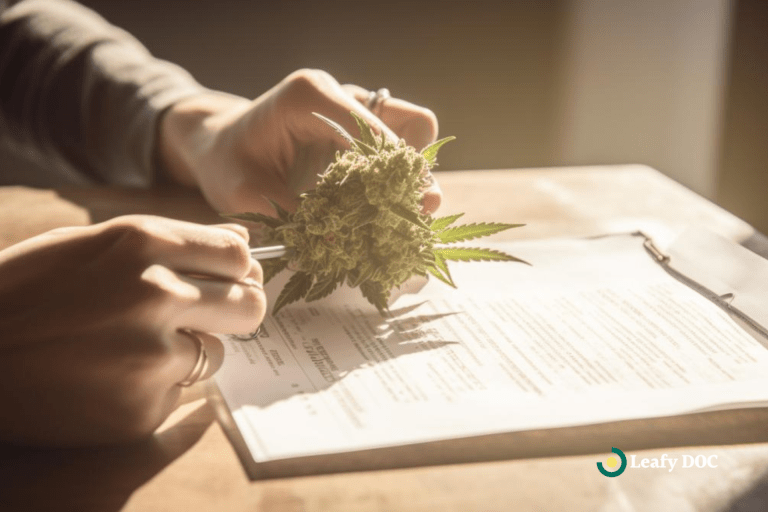Exploring The Effects Of THC On Sleep Patterns
by Ayesha Aziz · March 10, 2024
Unveiling the Surprising Effects of THC on Sleep Patterns: Find out how this compound in cannabis can impact your restful nights. Click here to uncover the truth and improve your sleep!

Are you someone who struggles with getting a good night’s sleep? Do you find yourself tossing and turning, unable to find that perfect position that will lull you into a deep slumber? Well, you’re not alone. Many people around the world face the same sleep challenges, and they’re constantly on the lookout for solutions that can help them achieve a restful night’s sleep.
One potential solution that has gained some attention is THC, the active compound found in marijuana. In this article, we will explore the effects of THC on sleep patterns and delve into the science behind how it works in your body.
When it comes to sleep patterns, there is a lot more going on than meets the eye. Sleep is a complex process that involves various stages, from light sleep to deep sleep and even dream-filled REM sleep. These stages are crucial for our overall health and well-being, as they help to restore and rejuvenate both our minds and bodies.
But what role does THC play in all of this? THC interacts with the endocannabinoid system in our bodies, which is responsible for regulating various physiological processes, including sleep. By binding to certain receptors in the brain, THC can potentially influence our sleep patterns and even improve sleep quality. However, it’s important to understand both the potential benefits and risks of using THC for sleep, as it may not be suitable for everyone.
So, let’s dive deeper into the fascinating world of THC and its effects on sleep, and discover whether it could be the solution you’ve been searching for.
Key Takeaways
- THC may have potential benefits for sleep disorders
- THC can disrupt normal sleep patterns and decrease REM sleep
- THC can cause drowsiness, grogginess, and difficulty waking up
- Considering the downsides and risks of THC is important before using it for sleep
The Science Behind Sleep Patterns
You already know that sleep patterns are regulated by various factors, but did you know that THC, the psychoactive compound found in cannabis, has been found to potentially disrupt these patterns?
THC interacts with the endocannabinoid system in the brain, which plays a crucial role in regulating sleep. When THC is consumed, it binds to the cannabinoid receptors in the brain, affecting the release of neurotransmitters and altering the normal sleep-wake cycle.
One of the ways THC may disrupt sleep patterns is by reducing the amount of REM sleep, also known as rapid eye movement sleep. REM sleep is the stage of sleep where dreams occur and is essential for memory consolidation and emotional processing.
Studies have shown that THC can decrease the amount of time spent in REM sleep, leading to a decrease in dream activity and potentially impacting cognitive function and emotional well-being.
In addition to reducing REM sleep, THC has also been found to increase the amount of deep sleep, also known as slow-wave sleep. While deep sleep is important for physical restoration and growth, an excess of it can lead to grogginess and a feeling of being overly tired upon waking up.
This disruption in sleep patterns can hurt overall sleep quality, leaving you feeling less rested and potentially affecting your daily functioning.
So, while THC may have its benefits for some individuals in terms of pain relief and relaxation, it’s important to be aware of its potential effects on sleep patterns.
If you find that THC is interfering with your sleep or leaving you feeling groggy in the morning, it may be worth considering alternative methods for managing pain or stress.
Understanding THC and its Effects on the Body
Firstly, it’s important to grasp the concept of how THC interacts with your body. THC, or tetrahydrocannabinol, is the main psychoactive component of cannabis. When you consume cannabis, THC enters your bloodstream and travels to your brain, where it binds to cannabinoid receptors.
These receptors are part of the endocannabinoid system, which plays a role in regulating various physiological processes, including sleep.
To better understand how THC affects your body, here are three key points to keep in mind:
- THC can induce feelings of relaxation and sedation: When THC binds to cannabinoid receptors in your brain, it can produce a calming effect, making you feel more relaxed and sleepy. This is why some people use cannabis as a sleep aid.
- THC can disrupt your sleep architecture: While THC may help you fall asleep faster, it can also interfere with the quality of your sleep. Studies have shown that THC can decrease the amount of REM sleep, which is important for memory consolidation and overall cognitive function. Additionally, THC can affect the duration and timing of different sleep stages, leading to less restful sleep overall.
- THC can impact your sleep-wake cycle: The endocannabinoid system, which THC interacts with, plays a role in regulating your sleep-wake cycle. THC can alter the release of certain neurotransmitters involved in this process, potentially affecting the timing and duration of your sleep. This can lead to a disrupted sleep schedule and difficulty maintaining a consistent sleep pattern.
So, while THC may have some initial benefits for sleep, it’s important to consider its potential negative effects on sleep quality and overall sleep patterns. It’s always a good idea to consult with a healthcare professional before using cannabis as a sleep aid, as they can provide personalized guidance and help you make informed decisions about your sleep health.
How THC Affects Sleep Quality
Unveiling the impact of THC on the tranquility of our slumber, it is important to understand how this compound affects our sleep quality. THC, the psychoactive compound found in cannabis, has been known to have both positive and negative effects on sleep. While it may help some individuals fall asleep faster, it can also disrupt the different stages of sleep, leading to a less restful slumber.
To better understand the effects of THC on sleep, let’s take a look at the table below:
| Positive Effects of THC on Sleep | Negative Effects of THC on Sleep |
|---|---|
| Can help with falling asleep faster | Disruption of REM sleep |
| May reduce the time it takes to fall asleep | Decreased deep sleep |
| Potential pain relief for individuals with chronic pain | Increased sleep disturbances |
| Can alleviate symptoms of sleep disorders | Impaired memory consolidation during sleep |
As you can see, THC has the potential to both aid and hinder our sleep quality. While it may help in falling asleep faster and provide pain relief for those with chronic pain, it can also disrupt the important stages of sleep, such as REM sleep and deep sleep. This can lead to increased sleep disturbances and impaired memory consolidation during sleep.
It is important to note that the effects of THC on sleep can vary from person to person. Factors such as dosage, frequency of use, and individual tolerance can all play a role in how THC affects sleep quality. If you are considering using THC for sleep purposes, it is recommended to consult with a healthcare professional who can provide personalized guidance and recommendations.
Potential Benefits of THC for Sleep Disorders
Additionally, using THC may potentially provide benefits for individuals suffering from sleep disorders. While more research is needed to fully understand the effects of THC on sleep disorders, early studies have shown promising results.
Here are some potential benefits of using THC for sleep disorders:
- Improved sleep quality: THC has been found to help individuals fall asleep faster and experience longer periods of deep sleep. This can lead to a more restful and rejuvenating sleep, allowing you to wake up feeling refreshed and ready to tackle the day.
- Reduced insomnia symptoms: Insomnia is a common sleep disorder characterized by difficulty falling asleep or staying asleep. THC may help alleviate insomnia symptoms by promoting relaxation and reducing anxiety, making it easier to drift off into a peaceful slumber.
- Pain relief: Many individuals with sleep disorders also suffer from chronic pain, which can further disrupt their sleep. THC has been shown to have pain-relieving properties, which can help alleviate discomfort and allow for a more comfortable sleep.
- Decreased nightmares: Nightmares can be a common symptom of certain sleep disorders, such as post-traumatic stress disorder (PTSD). THC has been found to reduce the frequency and intensity of nightmares, allowing individuals to have more peaceful dreams and a better overall sleep experience.
It’s important to note that the effects of THC on sleep disorders can vary from person to person, and it’s always best to consult with a healthcare professional before incorporating THC into your sleep routine. They can provide personalized advice and guidance based on your specific needs and medical history.
Potential Risks and Side Effects of THC on Sleep
Beware of the potential risks and side effects that THC may have on your sleep, for there’s more to a good night’s rest than meets the eye.
While THC has been found to have potential benefits for sleep disorders, it’s important to consider the potential downsides as well.
One of the main concerns with THC is its impact on the quality of your sleep. While it may help you fall asleep faster, studies have shown that THC can disrupt the normal sleep cycle, leading to a decrease in REM sleep. REM sleep is crucial for cognitive function, memory consolidation, and overall mental well-being. So, while you may be getting more hours of sleep, the quality of your sleep may be compromised.
Additionally, THC can also have an impact on your daytime functioning. It can cause drowsiness and grogginess, making it difficult to wake up in the morning and stay alert throughout the day. This can have a negative impact on your productivity and overall mood.
Furthermore, THC can also cause an increase in anxiety and paranoia, which can further disrupt your sleep patterns.
It’s important to consider these potential risks and side effects before incorporating THC into your sleep routine. While it may provide temporary relief, it’s important to explore other alternatives that can promote healthy sleep without the potential drawbacks.
Frequently Asked Questions
How long does THC stay in the body?
THC can stay in your body for varying lengths of time, depending on factors like frequency of use and metabolism. Typically, it can be detected in urine for up to 30 days, but in blood for only a few hours to a few days.
Can THC help with other sleep-related issues besides insomnia?
Yes, THC can potentially help with sleep-related issues beyond just insomnia. It has been shown to improve sleep quality, reduce nightmares, and alleviate symptoms of sleep apnea, restless leg syndrome, and PTSD-related sleep disturbances.
Is it safe to mix THC with other sleep aids or medications?
It’s important to consult with a healthcare professional before combining THC with other sleep aids or medications. They can provide guidance on potential interactions and ensure your safety. Your well-being is our priority.
Are there any long-term effects of regular THC use on sleep patterns?
Regular THC use can disrupt your sleep patterns in the long term. Research shows that 85% of frequent users experience decreased REM sleep, leading to daytime drowsiness and impaired cognitive function. Take care of your sleep, friend!
Can THC be used as a treatment for sleep apnea or other breathing-related sleep disorders?
Yes, THC can potentially be used as a treatment for sleep apnea and other breathing-related sleep disorders. It has shown promising results in improving breathing patterns and reducing symptoms in some studies.
Last Updated: August 8, 2024
Get Approved for Your Medical Marijuana Card in Minutes!

Get Your Medical Card
Connect with a licensed physician online in minutes

Like This Article?
Share with your friends
Table of Contents
Keep Reading
-
How Do I Get a Medical Marijuana Card in Texas?
Are you a Texas resident interested in obtaining a medical marijuana card? Check out this page to learn the requirements and how to get started.
-
Exploring The Benefits Of Having A Medical Marijuana Card
Unlock the Power of Pain Relief and Holistic Healing with a Medical Marijuana Card. Explore the amazing benefits today and click now to learn more!
-
Understanding The Application Process For A Medical Marijuana Card
Get relief with a medical marijuana card! Learn how to easily apply and navigate the application process in this step-by-step guide. Click now for all the information you need!



